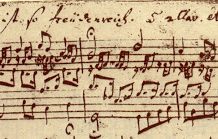Fr. Richard Rohr’s The Universal Christ is a popular spiritual book today. This New York Times Bestseller is rated highly in Amazon’s Religious Ethics category and has 4.7/5 stars from over five thousand global reviewers on Amazon.ca. Bono and Melinda Gates have praised the book, and it can be found on the shelves of many retreat centers. However, Fr. Rohr’s book contains assertions that seem to question the divinity of Jesus and the hypostatic union between Christ’s humanity and divinity. Strong Nestorian tendencies undermine the truth of Christ, the Son of God who perfectly unites his divine personhood with a human nature. For the one Lord Jesus Christ is both the uncreated Logos through whom the Father created the universe and the Jew who was crucified in the first century. Rohr tries to divide the Lord into a simple historical figure, “Jesus”, and a purely transcendent, universal, “liberating” Christ.[1]
In the early centuries of the Church, gnostic heretics divided Christ into a human Jesus who later received the Divine Christ. In response, the Church, guided by St. Irenaeus and others, assigned Mary the title Theotokos – God-Bearer – to reflect that the human baby she gave birth to was truly God. This baby was fully human and fully divine. But followers of Nestorius debated against this Marian title. Instead, trying to preserve a distinction between Christ’s humanity and divinity, they wanted to call her Christotokos, Christ-bearer, for they did not want to admit that Mary gave birth to God’s entirety. They asserted that Christ was made up of distinct human and divine persons.[2]
Fr. Rohr seems to follow Nestorian lines of thinking. He writes, “A merely personal God becomes tribal and sentimental, and a merely universal God never leaves the realm of abstract theory and philosophical principles. But when we learn to put them together, Jesus and Christ give us a God who is both personal and universal.”[3] In this passage, Jesus and Christ are two subjects who “give” (plural) us God. Using a similar grammatical effect, he argues “Jesus and Christ are both the CliffsNotes read on Reality.”[4] Referring to “Jesus” and “Christ” as distinct persons is not the language of the Scriptures or the Church’s Tradition.
Further, Rohr tries to argue that it is not precise to call Jesus God:
The full Christian leap of faith is trusting that Jesus together with Christ gave us one human but fully accurate window into the Eternal Now that we call God. This is a leap of faith that many believe that have made when they say “Jesus is God!” But strictly speaking, those words are not theologically correct. Christ is God, and Jesus is the Christ’s historical manifestation in time.[5]
The Franciscan believes that Jesus is the Jew who lived two thousand years ago, and Christ is the “Eternal Now”, but that they are not the same Person, since what is predicated about Christ cannot be predicated about Jesus. To borrow a simile from Trent Horn, the way Rohr talks about Jesus and Christ would be like saying “The Pope and Francis teach us about God.”[6]
While Rohr is right that Christ is not Jesus’ last name,[7] as perhaps some people today might assume, he uses the word Christ differently than the way it is used in the Scriptures and the Catechism. For example, Rohr states, “The Christ Mystery anoints all physical matter with eternal purpose from the very beginning. (We should not be surprised that the word we translate from the Greek as Christ comes from the Hebrew word mesach, meaning “the anointed” one, or Messiah. He reveals that all is anointed!)”[8] He downplays what it means for Christ to be the Anointed Saviour of mankind and quickly calls everything anointed. In fact, later in the book he argues that “an object that calls forth respect or reverence is the “Christ” or the anointed one for us at that moment”.[9]
However, not everything is anointed. That title is reserved for those who receive God’s anointing, such as the Old Testament kings, those who receive the sacrament of Confirmation, and above all, the Lord Jesus Christ.[10] Christ is not Jesus’ last name, but it is his title and so both names refer to the same Person.
As quoted above, Rohr states that “strictly speaking” it is not theologically correct to call Jesus God. He wants to agree with Nestorianism that Jesus is human, and Christ is God; they asserted this notion to protect the divinity of God and the humanity of Jesus and so they separated him in two. Aaron Riches explains: “The logic of Nestorius is animated in all things by separatio; the integral difference of divinity and humanity can only be maintained if the two remain ‘two’.”[11]
Further, Fr. Rohr strips the Lord Jesus of divinity when he writes,
You have to trust the messenger before you can trust the message, and that seems to be the Jesus Christ strategy. Too often, we have substituted the messenger for the message. As a result, we spent a great deal of time worshipping the messenger and trying to get other people to do the same…he did ask us several times to follow him, and never once to worship him.[12]
But people did worship him as a natural response to his claims and his miracles and he does not rebuke them for it, while other people in the New Testament are punished or corrected for worshipping what seems divine to them but is, in fact, just a creature. We can presume that if Jesus was a righteous Jew, and if he were but a creature, he would have corrected those who worshipped him, which would have been consistent with the rest of the New Testament.[13]
Jesus is either the Son of God, “a madman or something worse.”[14] The only other logical possibilities, besides being the Son of God, based on his claims, teachings, and actions, are that he was a lunatic or an evil liar. It is more plausible that he be a lunatic for saying “I am the way, the truth and the life,”[15] and dying for it, than that he be simply a messenger. Or, if not a lunatic or the Lord then he must have been evil for lying, saying things like “before Abraham was, I am”[16] while deceiving many people to follow him unconditionally, even to their own deaths. He is not just a human messenger.
The Fathers of the Church proclaim the same truth found in Sacred Scripture: The Lord Jesus Christ is the Word of God who assumed a human nature. St. Clement of Alexandria explains: “The Word, then, the Christ, is the cause both of our ancient beginning–for he was in God–and of our well-being. And now this same Word has appeared as man. He alone is both God and man…”[17] Secondly, in Origen’s words, “Although he was God, he took flesh; and having been made man, he remained what he was: God”.[18]
Pope St. John Paul II could not have made it any clearer:
To introduce any sort of separation between the Word and Jesus Christ is contrary to the Christian faith. St. John clearly states that the Word, who ‘was in the beginning with God’, is the very one who ‘became flesh’ (Jn 1:2, 14). Jesus is the Incarnate Word – a single and indivisible person. One cannot separate Jesus from the Christ or speak of a ‘Jesus of history’ who would differ from the ‘Christ of faith’.[19]
Indeed, as Riches notes, “the human nature of Jesus exists only as subsisting in the divine Son such that, in the Son, the human Jesus and the Lord God are ‘one and the same’ (unus et idem)”.[20]
While Fr. Rohr certainly has good intentions, and his book The Universal Christ contains some good spiritual reflections, there are Christological errors mixed within, which seem strongly bent on a new iteration of the Nestorian heresy. Further, as Trent Horn noted, many notions in the book contain half-truths, which are often more dangerous than outright lies. “The whole truth is generally the ally of virtue; a half-truth is always the ally of some vice,” notes G.K. Chesterton.[21] It is surely a challenge to understand the Incarnation, perhaps impossible for us mortals to fully comprehend how an impassible God could be crucified and die on the Cross. Nonetheless, Rohr, among others, restricts Jesus to a human nature and divides him from his title, Christ, as if “Christ” were a different, divine person. It is a convenient way to take away the divine authority of the teachings of Jesus Christ found in the Gospels and His Church, especially the hard moral ones. For, I can pick and choose the sayings I like from a simple human “Jesus” while also following a “universal Christ” of my imagination.
Endnotes
[1] Cf. Richard Rohr, The Universal Christ (New York, NY: Convergent Books, 2019), 18: “We ended up spreading our national cultures under the rubric of Jesus, instead of a universally liberating message under the name of Christ”.
[2] Cf. Oxford English Dictionary, Nestorianism: “The doctrine of Nestorius, patriarch of Constantinople (appointed in 428), by which Christ is asserted to have had distinct human and divine persons.”
[3] Rohr, 19.
[4] Rohr, 172.
[5] Rohr, 19.
[6] Cf. Trent Horn, “The False Christ of Fr. Richard Rohr,” YouTube, May 1, 2023, https://www.youtube.com/watch?v=bQKunFJnvIQ&t=842s.
[7] Rohr, 11.
[8] Rohr, 19.
[9] Rohr, 119.
[10] Cf. Horn, “The False Christ”. See also, CCC 453, Acts 10:38, Acts 28:20.
[11] Aaron Riches, Ecce Homo: On the Divine Unity of Christ (Grand Rapids, MI: William B. Eerdmans Publishing Company, 2016), 27.
[12] Rohr, 32-33.
[13] Cf. Mt 14:33, Rev 22:8-9.
[14] C.S. Lewis, Mere Christianity (Kindle Version: Business and Leadership Publishing, 2014), 48.
[15] Jn 14:6
[16] Jn 8:48
[17] Exhortation to the Greeks 1:7:1
[18] The Fundamental Doctrines 1:0:4
[19] Redemptoris missio, 6.
[20] Riches, 3.
[21] G.K. Chesterton, “Illustrated London News, June 11, 1910,” in Collected Works, vol. XXVIII (San Francisco: Ignatius Press, 1992).












